
Ürümqi, formerly known as Dihua, is the capital of the Xinjiang Uyghur Autonomous Region in the far northwest of the People's Republic of China. Ürümqi developed its reputation as a leading cultural and commercial center during the Qing dynasty in the 19th century.

The Lanzhou−Xinjiang railway or Lanxin railway, is the longest railway in Northwestern China. It runs 1904 kilometres from Lanzhou, Gansu, through the Hexi Corridor, to Ürümqi, in Xinjiang. It was Xinjiang's only rail link with the rest of China until the opening of the Lanzhou–Xinjiang high-speed railway in December 2014. The railway follows the path of the ancient Silk Road.
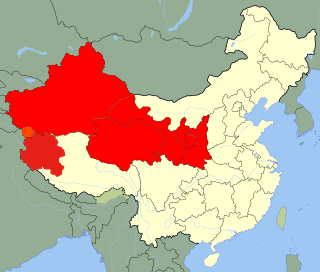
The Lanzhou Military Region was one of seven military regions in the People's Republic of China. It directed all People's Liberation Army and People's Armed Police forces in Xinjiang, Qinghai, Gansu, Ningxia, Shaanxi, and Ngari Prefecture in northwest Tibet. It was headquartered in Lanzhou in Gansu Province. It is bordered to the south by the Chengdu Military Region, and to the north by Mongolia, the Altai Republic, which is a political subdivision of the Russian Federation, and Kazakhstan. This region is now part of the Western Theater Command due to the military reforms of 2015.
Ürümqi People's Broadcasting Station was a radio station broadcasting to Ürümqi and the Xinjiang province area. It was operated by the Xinjiang Networking Transmission Limited in Mandarin and Uyghur. It existed from 1979 until 2019 when it merged with Ürümqi Television forming Ürümqi Radio and TV Station.
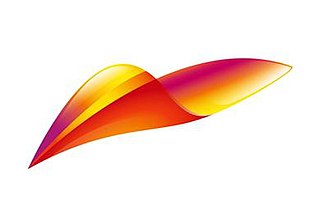
Xinjiang Television (XJTV) is a local television network station in the Xinjiang Uyghur Autonomous Region, China. It is the major television station in Xinjiang and is located in the capital Ürümqi. It was founded and started to broadcast on October 1, 1970. XJTV currently broadcasts in Mandarin, Uyghur, Kazakh, Kyrgyz and Mongolian languages. In May 2019, Xinjiang Television signed a strategic cooperation and technical assistance agreement with Huawei. So far, it is the only TV channel using the Turkic language based in a communist country.
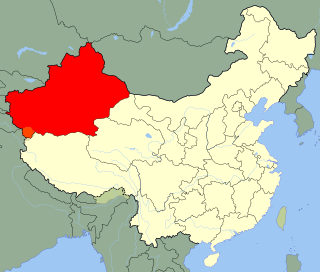
The 2008 Uyghur unrest is a loose name for incidents of communal violence by Uyghur people in Hotan and Qaraqash county of Western China, with incidents in March, April, and August 2008. The protests were spurred by the death in police custody of Mutallip Hajim.

Xinjiang University (XJU) is one of the major universities in the Xinjiang Uyghur Autonomous Region, People's Republic of China and is a national key university. Established in 1924 in Ürümqi, Xinjiang University is a comprehensive university with the highest academic level in Xinjiang, under Double First Class University Plan and former Project 211. It is a Chinese state Class B Double First Class University identified by the Ministry of Education.

The First Affiliated Hospital of Xinjiang Medical University is a teaching hospital in the western border of area of Urumqi, Xinjiang, China affiliated with Xinjiang Medical University. Founded in 1956 together with the university, the hospital is a college of clinical medicine affiliated with XMU. The hospital currently has 1357 beds with more than 1500 specialists.
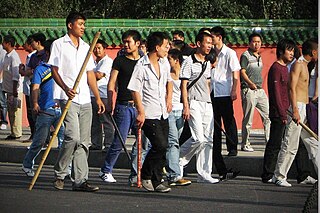
The July 2009 Ürümqi riots were a series of violent riots over several days that broke out on 5 July 2009 in Ürümqi, the capital city of the Xinjiang Uyghur Autonomous Region (XUAR), in northwestern China. The first day's rioting, which involved at least 1,000 Uyghurs, began as a protest, but escalated into violent attacks that mainly targeted Han people. A total of 197 people died, most of whom were Han people or non-Muslim minorities, with 1,721 others injured and many vehicles and buildings destroyed. Many Uyghurs disappeared during wide-scale police sweeps in the days following the riots; Human Rights Watch (HRW) documented 43 cases and said figures for real disappearances were likely to be much higher.

Li Zhi is a former Chinese politician who spent his career in Xinjiang, most notable for his role as the Communist party chief of Ürümqi during the city's rioting in July 2009. He was originally from Lixin, Anhui. He was detained by the authorities for investigation in 2015 and then expelled from the Chinese Communist Party.

Urumqi Television Station (UTV) is a state-owned television station in Ürümqi, Xinjiang, China. It was established in April, 1985 as a cable network and started broadcasting on September 28 in the same year. Its logo is shaped in red after Hong Shan, the city's landmark mountain.

Xinjiang Production and Construction Corps Radio and Television is a provincial satellite television station in Xinjiang, China, administered by the Xinjiang Production and Construction Corps (Bingtuan). It runs a television channel called Bingtuan Satellite Television (兵团卫视), which started its 24-hour satellite broadcasting through Sinosat-3 on 7 October 2007.

Ürümqi South railway station is a railway station of the Lanzhou–Xinjiang, Northern Xinjiang and the Second Ürümqi–Jinghe railways. The station is located in Ürümqi, Xinjiang Uyghur Autonomous Region, China. The name of the station was Ürümqi railway station from 1962 until September 1, 2014. This name is now assigned to the newly built high-speed railway station of the Lanzhou–Ürümqi High-Speed Railway.
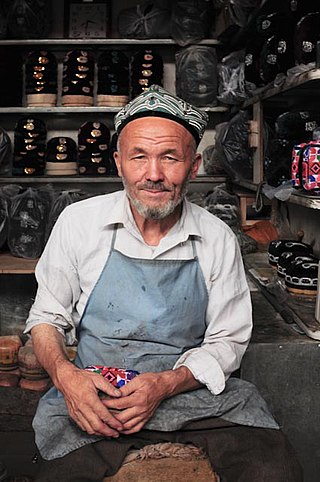
Uyghur Doppa Cultural Festival, is an internationally celebrated Uyghur cultural festival which is observed on May 5 annually since 2009.

On 30 April 2014, a bomb-and-knife attack occurred in the Chinese city of Ürümqi, Xinjiang. The terrorist attack killed 3 people, and injured 79 others. The attack coincided with the conclusion of a visit by Xi Jinping, General Secretary of the Chinese Communist Party to the region.
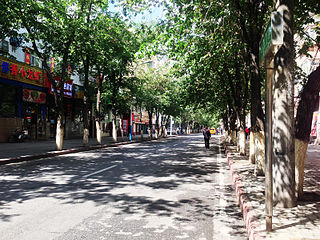
On the morning of 22 May 2014, two sport utility vehicles (SUVs) carrying five assailants were driven into a busy street market in Ürümqi, the capital of China's Xinjiang Uyghur Autonomous Region. Up to a dozen explosives were thrown at shoppers from the windows of the SUVs. The SUVs crashed into shoppers, then collided with each other and exploded. 43 people were killed, including 4 of the assailants, and more than 90 wounded, making this the deadliest attack of the Xinjiang conflict. The event was designated as a terrorist attack.
Xinjiang People's Broadcasting Station (XJBS) was a radio station broadcasting to the Xinjiang province area. It was operated by the Xinjiang Networking Transmission Limited in Mandarin, Uyghur, Kazakh, Kyrgyz and Mongolian languages. Founded as Dihua People's Broadcasting Station in 1949 it was renamed after Xinjiang in 1951. In 2018 it merged with Xinjiang Television (XJTV) forming the Xinjiang Radio and TV Station.
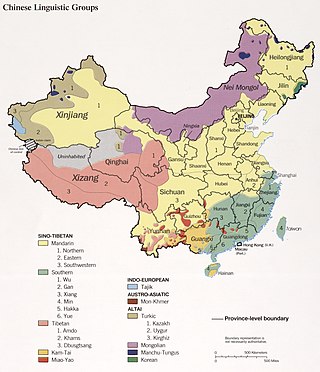
Ethnic broadcasting in China comprises both radio and TV broadcasting for some of the numerous ethnic groups within the country. Stations are found on the administrative levels of the nation as a whole, provinces, prefectures, and counties. They form a part of the ethnic media of China.















